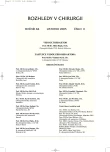-
Medical journals
- Career
Surgery in the Elderly
Authors: J. Šváb
Authors‘ workplace: I. chirurgická klinika 1. LF UK a VFN v Praze, přednosta doc. MUDr. J. Šváb, CSc.
Published in: Rozhl. Chir., 2005, roč. 84, č. 11, s. 552-556.
Category: Monothematic special - Original
Overview
Among the steadily increasing population of surgical older patients than 65 yr are the fast growing group about 85 yr and older. Postoperative averse effects on the cardiac, pulmonary, cerebral and urinary systems are the main concerns for elderly surgical patients who are at high risk. The function capacity of organs reduces with age, resulting in decreased reserve and ability to endure stress. The effect of anesthetics on postoperative delirium has been studied and a leasing hyposthesis has been that offending druha aggravate an age-associated central cholinergic insufficiency. In additional to being linked to narcotics, sedative, and anticholinergics, delirium has been associated with urinary tract infection, pneumonia, hypoxia or hypercarbia, fever, blood loss, and electrolyte disturbances. In this review, we document the incidence of postoperative averse outcomes and discuss way of improving perioperative anaesthesia care for this vulnerable surgical population. There is present possibility anaesthesia in elderly.
Key words:
age functional factors – surgery in elderly – anaesthesia in elderly
Labels
Surgery Orthopaedics Trauma surgery
Article was published inPerspectives in Surgery

2005 Issue 11-
All articles in this issue
- Surgical Complications of Laparoscopic Colectomy in Patients with Colorectal Carcinomas
- Small Bowel Perforation as a Late Complication after Laparoscopic Hernioplasty
- Retromuscular Mesh Repair of a Hernia in a Scar According to Rives – Our First Experience
- Giant Retroperitoneal Liposarkomas
- Surgery in the Elderly
- Fast Track in Surgery
- Management of Pseudoarthrosis of the Navicular Bone of the Wrist Using the Synthes 3.0
- Treatment of Iatrogenic Bile Duct Lesions from Laparoscopic Cholecystectomy
- Management of Infection after Aorto-femoral Arterial Reconstruction
- Laparoscopic Management of an Infected Oesophageal Cyst
- Comparison Study on the Use of Tubular and Spiral Thoracic Drains Following Lung Resections. A Prospective Study
- Perspectives in Surgery
- Journal archive
- Current issue
- Online only
- About the journal
Most read in this issue- Retromuscular Mesh Repair of a Hernia in a Scar According to Rives – Our First Experience
- Small Bowel Perforation as a Late Complication after Laparoscopic Hernioplasty
- Fast Track in Surgery
- Management of Pseudoarthrosis of the Navicular Bone of the Wrist Using the Synthes 3.0
Login#ADS_BOTTOM_SCRIPTS#Forgotten passwordEnter the email address that you registered with. We will send you instructions on how to set a new password.
- Career

